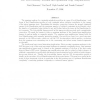Free Online Productivity Tools
i2Speak
i2Symbol
i2OCR
iTex2Img
iWeb2Print
iWeb2Shot
i2Type
iPdf2Split
iPdf2Merge
i2Bopomofo
i2Arabic
i2Style
i2Image
i2PDF
iLatex2Rtf
Sci2ools
125
click to vote
STOC
2009
ACM
2009
ACM
The detectability lemma and quantum gap amplification
The quantum analog of a constraint satisfaction problem is a sum of local Hamiltonians - each (term of the) Hamiltonian specifies a local constraint whose violation contributes to the energy of the given quantum state. Formalizing the intuitive connection between the ground (minimal) energy of the Hamiltonian and the minimum number of violated constraints is problematic, since the number of constraints being violated is not well defined when the terms in the Hamiltonian do not commute. The detectability lemma proved in this paper provides precisely such a quantitative connection. We apply the lemma to derive a quantum analogue of the classical gap amplification lemma of random walks on expander graphs. The quantum gap amplification lemma holds for local Hamiltonians with expander interaction graphs. Our proofs are based on a novel structure imposed on the Hilbert space, which we call the XY decomposition, which enables a reduction from the quantum non-commuting case to the commuting c...
Algorithms | Gap Amplification Lemma | Quantum Gap Amplification | Quantum Hamiltonian Complexity | STOC 2009 |
| Added | 23 Nov 2009 |
| Updated | 23 Nov 2009 |
| Type | Conference |
| Year | 2009 |
| Where | STOC |
| Authors | Dorit Aharonov, Itai Arad, Zeph Landau, Umesh V. Vazirani |
Comments (0)

